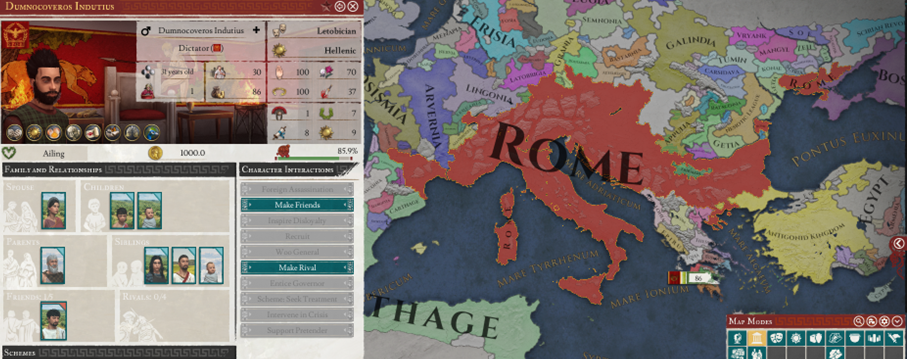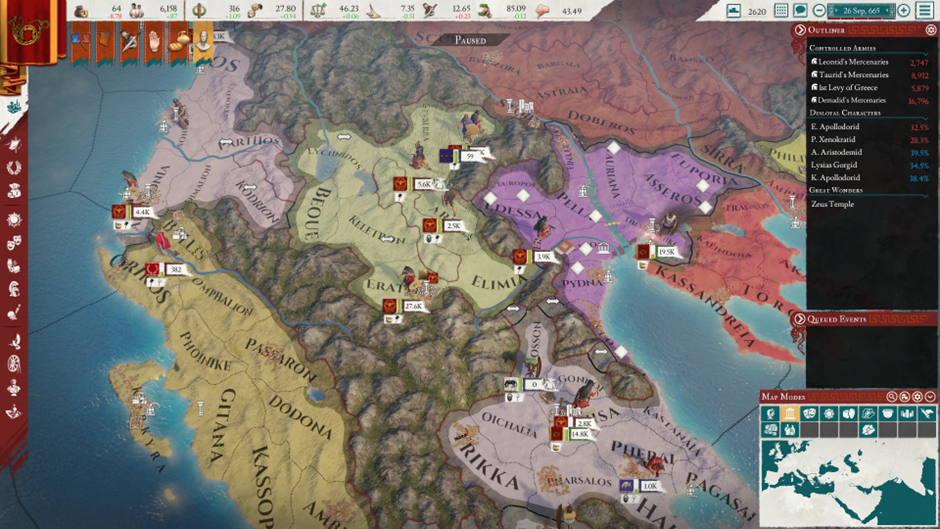Chapter 5
Chapter 5: The Heroes of Greece
Rome was one of the most powerful nations in the world, but split in two, the combined force of the Greeks and the Egyptians could be enough to defeat them.

The once small troops of Greeks that had protected and expanded Patrai’s and Archaea’s borders had developed into an army, with 23,000 troops, able to match the might of even the biggest of Rome’s legions.

The navy had also been rebuilt with 14 new decaremes, the largest ships to ever grace the mediterranean. A Group of Roman ships were caught off the coast of Greece and quickly defeated. Capturing many of the Roman’s small ships.

Eager to continue their victories, Admiral Philinos took a fight against the full Roman Navy. The Greeks, certain of victory charged the Roman fleet out of formation, the fast but weak Biremes and Triremes took the front line, including the heavily damaged captured Roman ships. Without the aid of their larger brethren the Greek support fleet was destroyed and fled, leaving the decaremes and octeres to enter the battle unsupported.

Philinos, wary of losing any of the large Greek ships to the Romans retreated from the battle. The Romans navy, knowing that losing to the Greeks would be a disaster for their civil war stayed clear of Greek waters for the rest of the war.

Philinos was fired for his mistakes, his replacement Bikon, took advantage of the Romans no longer patrolling their shores to raid Roman cities. Turning Nobles into Slaves

On land, the Achaeans went relatively unopposed, while the fourth and fifth legions of Rome tried to retake land from the Achaeans, they were given strict orders to avoid the Achaean army itself in order to preserve themselves for the Civil war.

As the war drew out, it became clear that the would-be dictator Tiberius Fabius Rullianus, had lost on every front.

Tiberius took a humiliating peace deal that ended Roman rule in Greece and Asia and restored two buffer states between the Greeks and Romans.

The people of Greece rejoiced at their triumph over the Romans, the period brought a revival of Greek culture which cumulated in the creation of a new Epic, The Argonautica. Set just before the Trojan war, it followed the Argonauts, a group of heroes from all over Greece, who sailed the ship Argo under Jason. The Argonautica was a story of Greeks united under a single leader, working together to achieve the impossible. Many comparisons were giving between the Argo and Achaea.
However, a single Argonaut caused strife in the Archaean government, the Gerousia, “Thersanon of Andros”.

Andros had long been a contentious subject in Greek politics, while the island was allowed to self-govern, it did so under the rule of Egypt, not Achaea, Andros had also not been conquered by Egypt, it had been freed by them from Macedon and had supported them. Not unlike how Egypt had supported Achaea all this time.
Whether the Argonautica had been intended to cause strife, it would now serve as a constant reminder of the shortcomings of Achaea’s new Greece while Egyptian suzerainty over Andros remained unchallenged . If Egypt would not surrender Andros peacefully, then it would be War.
Rome was one of the most powerful nations in the world, but split in two, the combined force of the Greeks and the Egyptians could be enough to defeat them.

The once small troops of Greeks that had protected and expanded Patrai’s and Archaea’s borders had developed into an army, with 23,000 troops, able to match the might of even the biggest of Rome’s legions.

The navy had also been rebuilt with 14 new decaremes, the largest ships to ever grace the mediterranean. A Group of Roman ships were caught off the coast of Greece and quickly defeated. Capturing many of the Roman’s small ships.

Eager to continue their victories, Admiral Philinos took a fight against the full Roman Navy. The Greeks, certain of victory charged the Roman fleet out of formation, the fast but weak Biremes and Triremes took the front line, including the heavily damaged captured Roman ships. Without the aid of their larger brethren the Greek support fleet was destroyed and fled, leaving the decaremes and octeres to enter the battle unsupported.

Philinos, wary of losing any of the large Greek ships to the Romans retreated from the battle. The Romans navy, knowing that losing to the Greeks would be a disaster for their civil war stayed clear of Greek waters for the rest of the war.

Philinos was fired for his mistakes, his replacement Bikon, took advantage of the Romans no longer patrolling their shores to raid Roman cities. Turning Nobles into Slaves

On land, the Achaeans went relatively unopposed, while the fourth and fifth legions of Rome tried to retake land from the Achaeans, they were given strict orders to avoid the Achaean army itself in order to preserve themselves for the Civil war.

As the war drew out, it became clear that the would-be dictator Tiberius Fabius Rullianus, had lost on every front.

Tiberius took a humiliating peace deal that ended Roman rule in Greece and Asia and restored two buffer states between the Greeks and Romans.

The people of Greece rejoiced at their triumph over the Romans, the period brought a revival of Greek culture which cumulated in the creation of a new Epic, The Argonautica. Set just before the Trojan war, it followed the Argonauts, a group of heroes from all over Greece, who sailed the ship Argo under Jason. The Argonautica was a story of Greeks united under a single leader, working together to achieve the impossible. Many comparisons were giving between the Argo and Achaea.
However, a single Argonaut caused strife in the Archaean government, the Gerousia, “Thersanon of Andros”.

Andros had long been a contentious subject in Greek politics, while the island was allowed to self-govern, it did so under the rule of Egypt, not Achaea, Andros had also not been conquered by Egypt, it had been freed by them from Macedon and had supported them. Not unlike how Egypt had supported Achaea all this time.
Whether the Argonautica had been intended to cause strife, it would now serve as a constant reminder of the shortcomings of Achaea’s new Greece while Egyptian suzerainty over Andros remained unchallenged . If Egypt would not surrender Andros peacefully, then it would be War.
Last edited:
- 2














































































